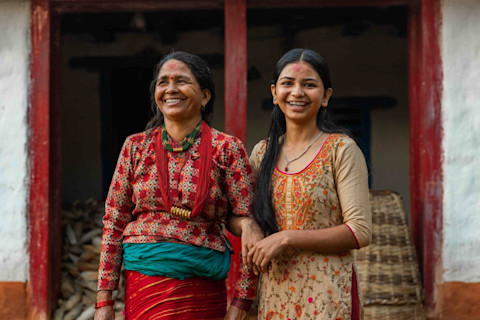Right now, moms are braiding hair before school. They’re dashing out the door for work. They’re packing lunch with care. They’re studying for degrees during their (rare) free time. They’re tucking their children in for bed — and then triple-checking for monsters. They’re developing their skills and following their dreams while inspiring their children to do the same.
Around the world, motherhood takes on a billion different forms. Still, there’s a unifying truth: It’s the hardest — and likely, the most under-appreciated — job in the world.
Motherhood is challenging. Rewarding. Exhausting. Hilarious. (Sometimes, all at once.)
But for some, the role is especially backbreaking. In addition to carrying the collective weight of their households — recipes and schedules, hopes and fears — some moms also carry dirty water.
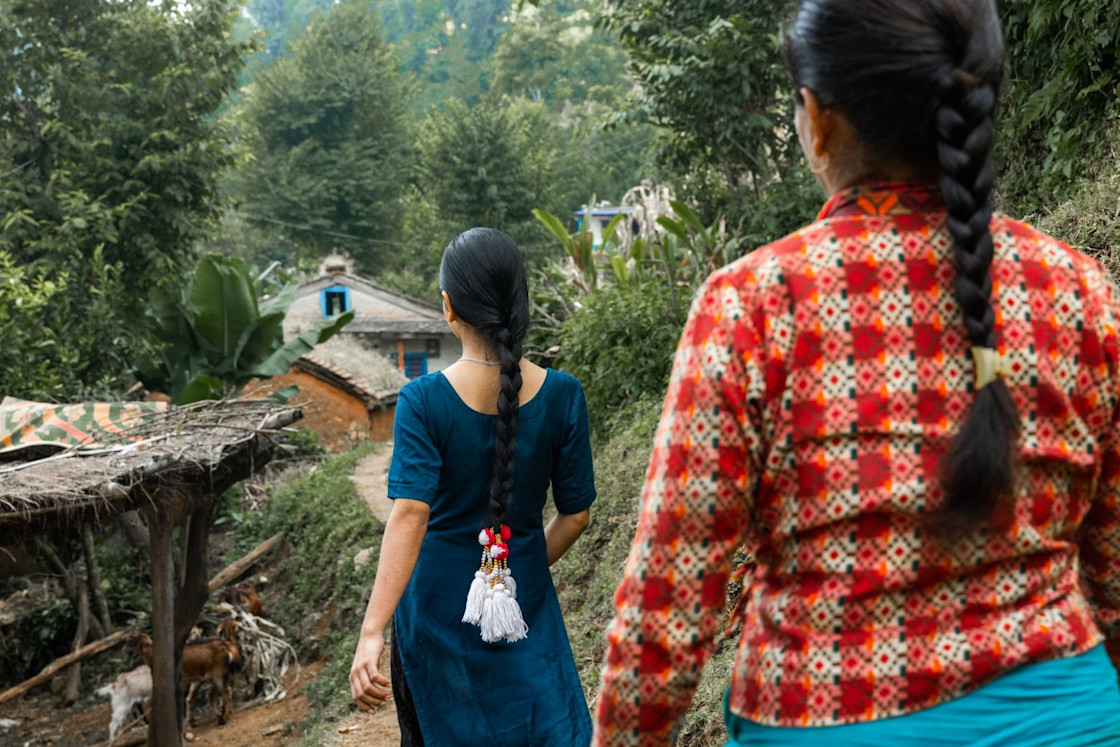
Worldwide, mothers and daughters spend an estimated 200 million hours walking for water each day.1
Instead of sleeping deeply, moms are waking before the sun and walking miles to the nearest river. Instead of greeting their children after school, moms are halfway through their third or fourth walk of the day. Instead of earning an income — an act of self-empowerment that raises women’s social capital and provides independent economic security — mothers are walking for water.
And then spending hours purifying that water (if they have the money for firewood).
And then spending hours walking for more water once it inevitably runs out all too soon.
Instead of thriving, millions of moms in rural communities are barely surviving.
Moms like Maya Devi.
Maya Devi lost both of her parents when she was young.
“I learned everything by myself. No one actually taught me or guided me,” she said.
At first, Maya Devi didn’t want a family of her own. She thought remaining single would be easier, free from the responsibilities of caring for a husband and several children. But at 23, her brothers arranged for Maya Devi to be married. At 24, she gave birth to her oldest son and everything changed.
Suddenly, Maya Devi was in uncharted — and often choppy — waters: motherhood. But Maya Devi is resilient, intelligent, and kind. As an orphan, she endured countless struggles. As a mother, she would protect her children from experiencing the same hardships.
No matter what, she would create a safe harbor for her children… and be the wind in their sails.
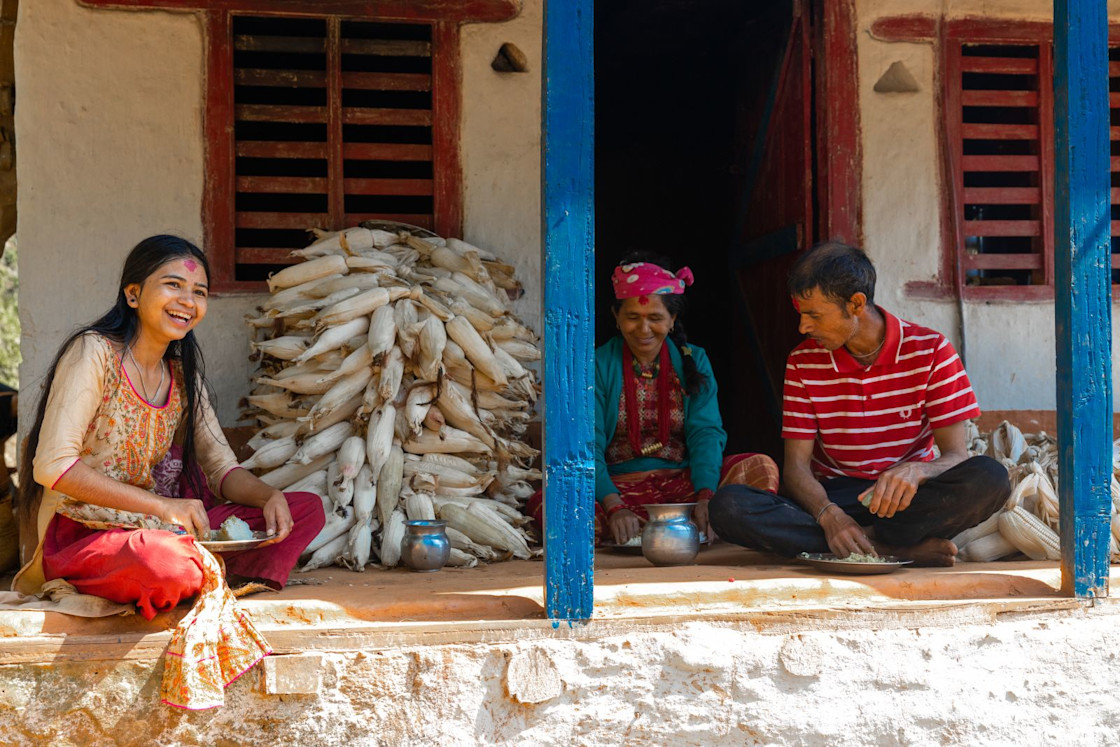
Now 50 and a proud mother of four, Maya Devi doesn’t have any regrets. If anything, she wishes she would’ve started a family even sooner! (She thinks it would’ve guaranteed her a grandchild by now.)
“I expected to live a lonely life, but instead, I now have such a wonderful family,” Maya Devi said, beaming with joy. “I’m happy to see [my daughters] grow in front of me. That is my joy because I was an orphan from an early age and had no one.”
Maya Devi is especially close with her youngest daughter, Sarmila.
Considerate, joyful, and bright, Sarmila seems like a direct reflection of her mother. Maya Devi sees herself in the bright 18-year-old: they share the same features and mannerisms.
Every mother wants better for their children, and Maya Devi is no different. Without the opportunity to earn an education as a child, Maya Devi feels limited in her opportunities as an adult. So, she always encourages her daughters to study diligently.
“[My mother] suffered a lot, and she didn’t want the same for us,” Sarmila explained. “[She said] that we wouldn’t have to endure what she did if we studied and made a name for ourselves. That encouraged us to focus on our education even more.”
“I have gone through so much in life, and I wouldn’t want the same for my daughters,” Maya Devi agreed. “That’s why I wanted to educate them. If they are educated, they wouldn’t have to suffer and endure like me.”
Sarmila took her mother’s words to heart. She completed every level of schooling without failing a single subject. (A fact Maya Devi recites with glowing pride.)
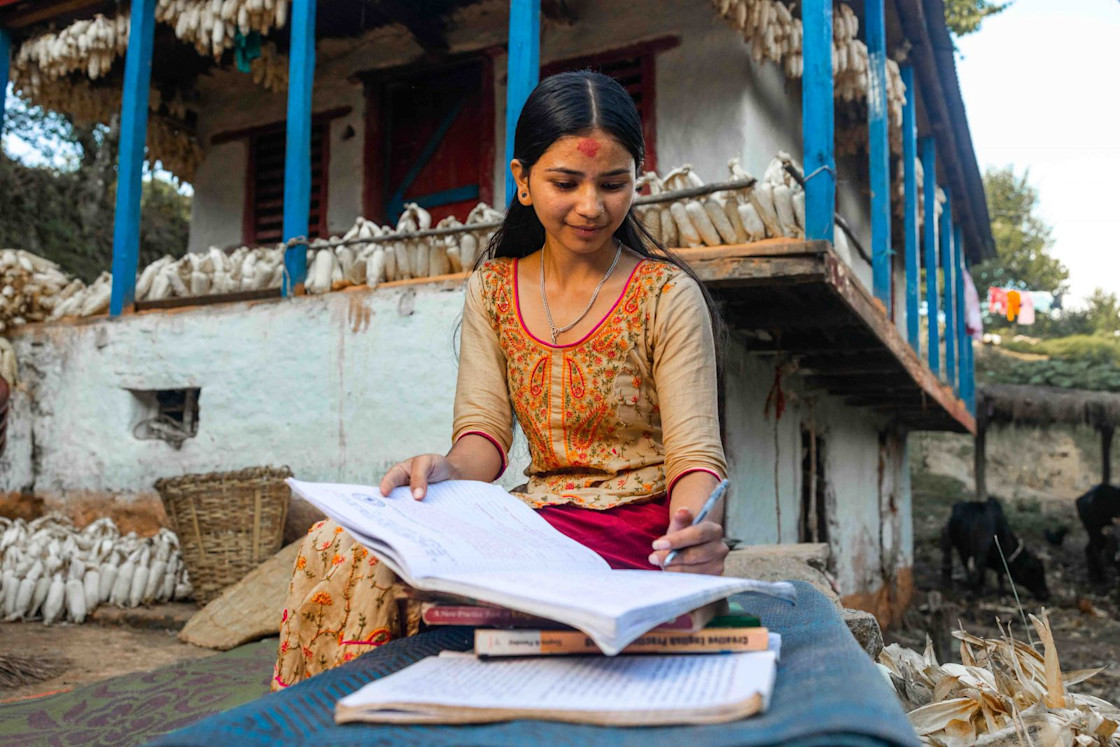
Today, Sarmila and her older sister both study in Surket, a city several hours away. When they complete their teaching certificates, they’ll return home and teach locally. They’re passionate about equipping children to excel academically, a path that has transformed both of their lives for the better. They want to invest in the future of their hometown, and they hope their efforts prevent young girls from being trafficked and abused — a grave concern in rural Nepal.
But until they graduate, the sisters only visit home on school holidays.
Maya Devi is cheering her daughters on as they complete their studies, but the time apart is still difficult. When they’re away, Maya Devi misses them desperately. She counts down the days until they return.
When they’re finally reunited, Maya Devi’s daughters won’t let her lift a finger. The sisters chide Maya Devi if she tries to complete a household chore on her own, ordering her to sit and rest. They ask her to braid their hair like she did when they were little.
“My daughters tell me, ‘I am here for you. I will work for you. I will help you.’”
During the holidays, the entire family gathers for meals. They share their joys and sorrows. It’s an idyllic scene: seven people sitting and laughing at jokes old and new. Reminiscing over the past. Sharing their hopes for the future.
Life is easier now — and when they’re together, nearly perfect — but it wasn’t always.
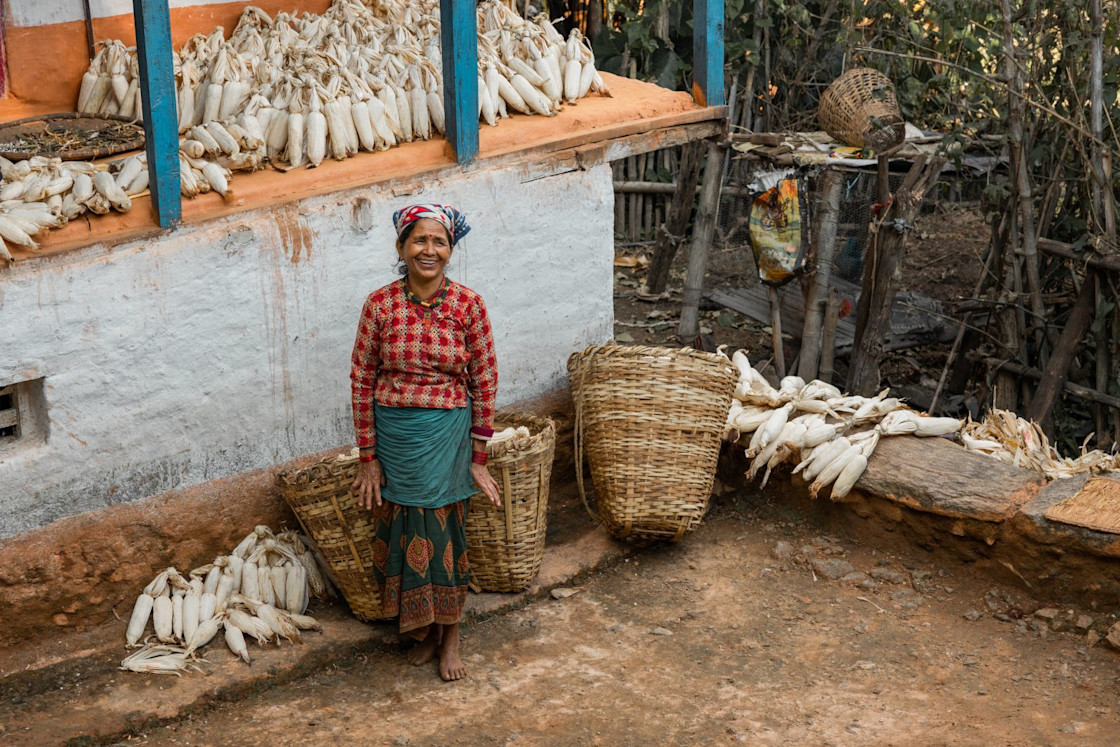
Maya Devi always encouraged her children to work toward their dreams. Just one thing stood in the way of her daughters’ education: dirty water.
Maya Devi lived in the same mountain community for 27 years: more than half of her life. And the entire time, she lived without reliable access to clean water.
Maya Devi used to walk an hour round-trip to the nearest water source. When her children were infants, she’d carry them against her chest while simultaneously lugging a heavy clay water container on her back, called a gagri. Sometimes, her head would be so sore from the weight-bearing strap, she couldn’t even touch her forehead.
She’d make seven or eight trips just to care for her family of six and their animals. She’d wake up as early as 4 a.m. each day to avoid a long line: a queue that could add another 30 minutes to the journey.
The path was steep and slippery. It was common for women to slip and fall, the fruits of their labor instantly disappearing into the hungry ground. And then, the climb would begin again.
(Once, Maya Devi’s children slipped and shattered the gagri. They didn’t tell her, afraid she’d be disappointed, and she didn’t notice until she went to get a drink and the water bowl was empty.)
“We definitely broke a few containers,” Sarmila confessed with a chuckle.
As her daughters grew and household responsibilities became shared, dirty water stole more and more time from school.
“Going to the water source used to take us a long time. That was the most difficult issue I was having,” Sarmila remembers. “We wouldn’t reach school on time, and we were obviously chastised and even punished by the teachers.”
But then, Aveda intervened. Aveda is a global network of salons committed to integrating sustainability and quality in every beauty product. Since 2018, they’ve partnered with charity: water to raise more than $4.77M for clean water.
In 2020, Maya Devi’s community received a solar-powered piped water solution generously funded by Aveda Earth Month. The piped system brings clean water to over 80 households and 400 people: eliminating the burden of the walk for water.
At 50 years old, Maya Devi has reliable access to clean water for the first time.
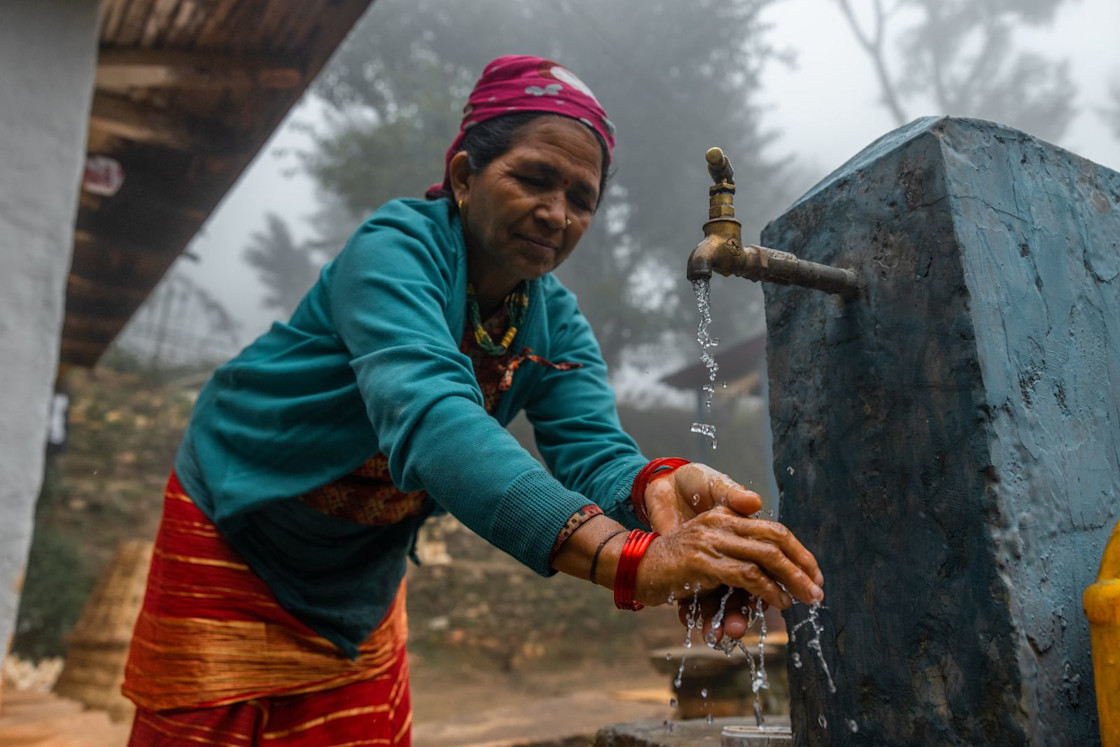
Access to a piped water system saves families 1-2 hours a day in water collection, increasing opportunities for moms to attend school, earn an income, care for their children, or build social capital.2
For Maya Devi, that means slower mornings and freer days. And it meant her daughters could spend less time walking, and more time working toward their goals.
“[Clean water] certainly saved us a lot of time for studying,” Sarmilla said.
Maya Devi powerfully described how clean water has changed her life for the better.
“I don’t have any concerns anymore. We have water at home and can do everything easily. What else is there to worry about? We can disinfect or clean the house anytime we want if we have water. We can wash our dishes properly. We can do everything and anything.”
“All these years, I’ve carried [my children] while collecting water,” Maya Devi explained. “Now, we can sit down together and talk about things. We can do what we want at our leisure, and we can sleep as much as we want. We can take it easy.”
Aside from the pain she feels when her children are away — a familiar feeling for mothers all over the world — Maya Devi is resting easier now.
She knows she can get water (more than she ever used before!) whenever she needs to. She knows that she has a home, a husband, and a family to love and be loved by. And she knows that her daughters – just a mountain range out of reach — are pursuing their dreams.
Even when out of sight, Maya Devi never leaves Sarmila’s mind.
“My mother is more valuable to me than all of the world’s wealth or possessions. My mother is everything to me. I may amass wealth and money in the future, but my mother is priceless to me.”
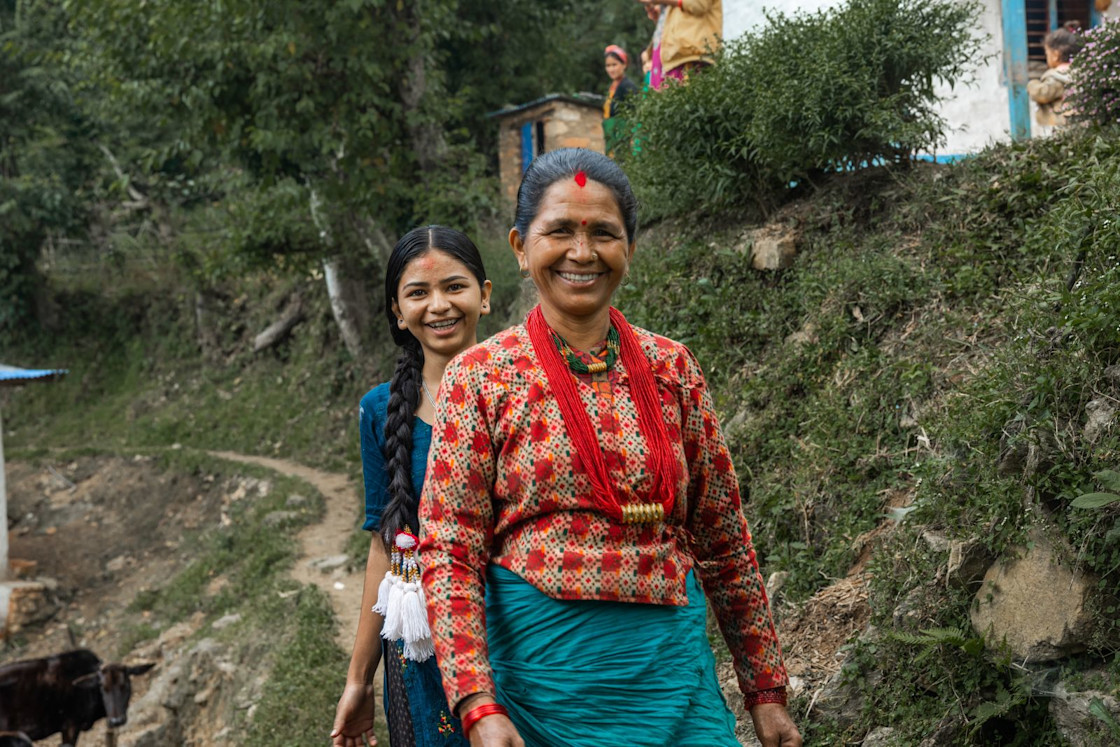
Maya Devi taught Sarmila to follow her dreams — unhindered by the obstacles of her gender or the burden of dirty water. In just a few years, Sarmila will teach the children of her community how to read and write. And, even more importantly, she’ll encourage her students to create a name for themselves.
“I will tell younger girls that you have to study hard because there’s nothing greater than education. If we work hard, we’ll definitely secure a bright future. When I become a mother myself one day, I’ll make sure I educate my children. The way that my mother has always encouraged me to pursue education,” Sarmila explained.
Back home, Maya Devi awaits her daughters’ return. Each visit brings new memories to cherish and new lessons to absorb.
“My daughters have taught me numerous things. They teach me about the advantages and benefits of having an education. They say, ‘Life would be hard without education, so we’ve got to study.’ They tell me, ‘You should at least learn to write your name and give people directions.’”
But for Maya Devi, one lesson shines above them all:
“I’ve learned that even an orphan like me can create something of my life.”
Her words stunned and deeply moved our team.
“I’ve learned that even an orphan like me can create something of my life.”
Our team left Nepal with dozens of stories to share with you: first-hand accounts of transformation and the hope that motivates hard work.
Still, Maya Devi’s story stood out. She reminded us that a mother’s love truly knows no bounds. That — with courage and kindness — no one is limited to the challenges of their childhood or the socially-imposed limitations of their gender.
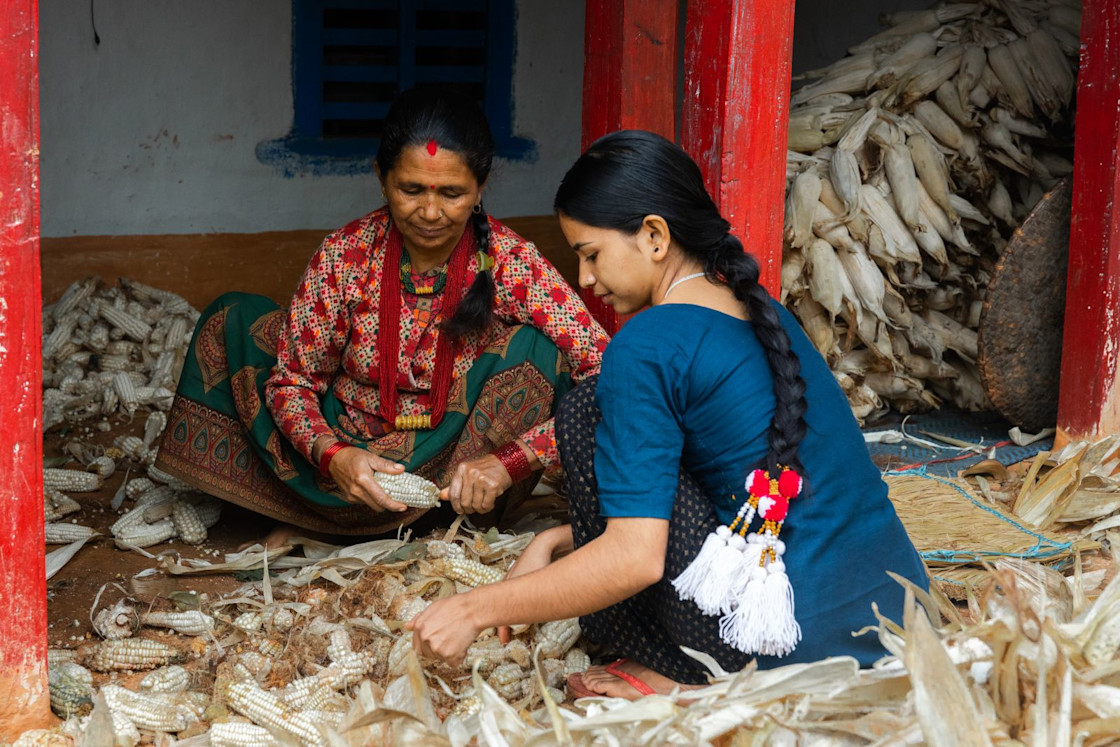
Today, our Creative team is back home in the States, surrounded by families of their own, large and small. And today, we hug our moms a little tighter because of Maya Devi and Sarmila’s example: a mother and daughter bound by love.
The kind of love that desperately desires the very best for each other.
The kind of love that has roots and wings.
The kind of love that’s stronger than any hand pump, deeper than any borehole, and reaching farther than any piped system.
The kind of love only a mother can create.
1. UNICEF: Collecting water is often a colossal waste of time for women and girls
2. Water and Sanitation Assessment, The Copenhagen Consensus Center
Photos By: Cubby Graham

